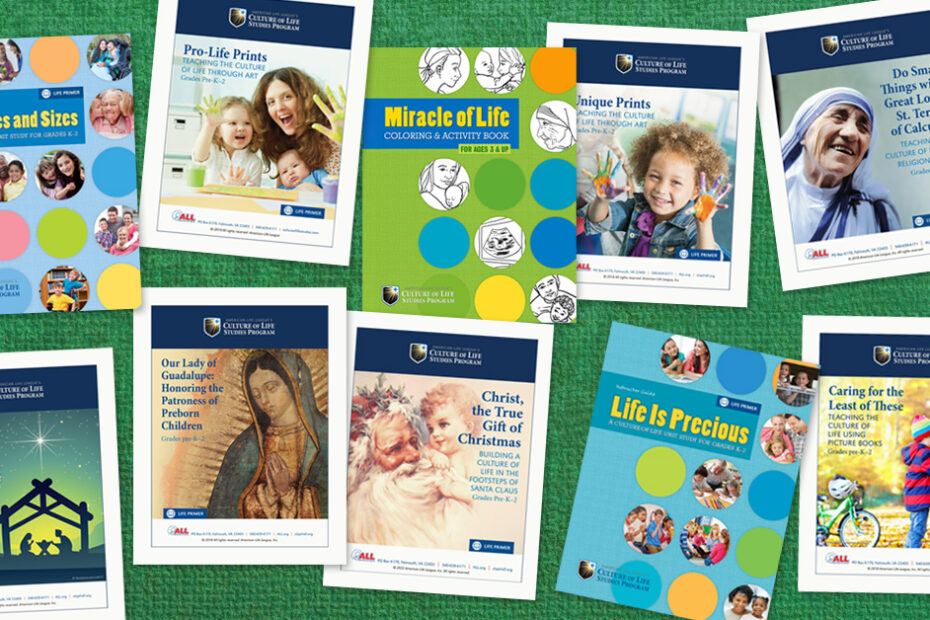By Susan Ciancio
Do you find it difficult to talk to your kids about serious topics? Are you confused about where to start, what to say, or how to impart the truth of Church teaching?
We get it, as we have been there too. But we truly believe the words of the Catechism of the Catholic Church when it teaches that “parents have the first responsibility for the education of their children” and that “the home is well suited for education in the virtues.”
No matter where our children go to school, it is our responsibility as parents to give them pro-life education rooted in our faith.
Why is education at home so important? The home is a safe place to ask questions, to delve deeper into subjects, and to work through any confusion. In addition, it’s one of the best places for kids to see their parents modeling pro-life values.
That’s why materials from the Culture of Life Studies Program are so valuable.
We offer pro-life lessons on a range of topics and pro-life heroes for kids in pre-K all the way through high school. All are easily downloadable and can be taught anywhere. You don’t have to stand up in the middle of your family room like you are in a classroom. You can simply cuddle on the couch and read them aloud, just like you would read any book to your child.
And as your child grows out of the desire to cuddle, you can simply read our lessons and summarize the information for them or have them read those pages and then use the included questions to generate impactful discussions. You can talk in the car on the way to sports practice or dance class, around the dinner table, or while you’re playing a game or putting together a puzzle.
Last year, we released five new lessons and an Advent reflection booklet. So far this year, we have released a Lent booklet and have new lessons in the works.
To help you become more familiar with our lessons, we want to highlight some of our favorites.
1. St. Carlo Acutis: Extraordinary in the Ordinary
This lesson teaches high school students about the short yet impactful life of St. Carlo Acutis (who will be canonized April 27!), a youth who used his exceptional computer skills to create a website cataloging the Catholic Church’s approved Eucharistic miracles. Carlo is a beautiful example of how living an ordinary life can become extraordinary because of faith, love of Jesus in the Eucharist, and generosity toward others.
2. The Beauty of the Developing Human Being
This is a four-class lesson for middle schoolers that explores the science of the earliest moments of a person’s life and gives students a firm foundation regarding the fact that every human being’s life must be protected from creation until death.
3. Unconditional Love and Respect for Everyone: St. John Bosco
Middle school students will learn about the life of St. John Bosco and how he created a home and school for young boys who had nowhere to go and no one to care for them. Through stories about his lessons and his life, students will learn to reflect on potential prejudices they have toward certain people based on their appearances, behaviors, or financial status. They will be challenged to think about how their own choices can have a lasting positive impact when they treat all people with respect.
4. The Golden Rule and Love for Those Who Hurt Us
This lesson introduces middle school students to the part of Jesus’ teaching from the Sermon on the Mount known as the Golden Rule. Students will learn the importance of doing to others as they would have others do to them. Through discussion, examples from Jesus’ time, and real-life scenarios, students will develop both compassion and empathy in their dealings with family, friends, and those they may not like.
This 16-class lesson for kids in kindergarten and older helps students understand that every human being has value because we are all made in the image and likeness of God. Our value does not depend on our appearance, ability, or background. Students will learn about Down syndrome, autism, the beauty of the elderly, and the fact that it’s okay to be different.
This four-class lesson for middle schoolers teaches students that God created marriage between one man and one woman. Through the lives of saints and saintly couples, students learn how they can stand up and defend marriage and the family in our society.
7. St. Ignatius: Cura Personalis
In this two-day lesson, students will learn about the Ignatian concept of cura personalis—care for the whole person. The first lesson in this two-part series challenges students to care for themselves by caring for their whole person (heart, soul, mind, and body). The second lesson teaches students the importance of cura personalis toward others and debunks the lie of the “you do you” mentality. Through readings, discussion, and thought-provoking activities, students will come to understand the importance of caring for a person, both body and soul.
You can find these and more than 40 lessons for kids of all ages on our site.
